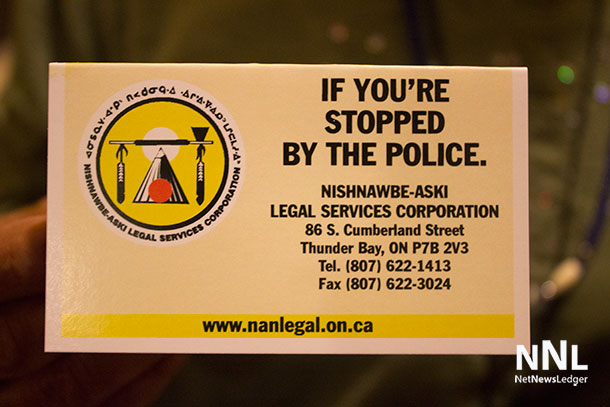THUNDER BAY – Ontario is building safer communities and protecting individual rights by banning the arbitrary and race-based collection of identifying information by police, referred to as carding or street checks. “This regulation delivers on our government’s commitment to prohibit carding and street checks in Ontario. It both bans the arbitrary and race-based collection of identifying information and establishes clear and consistent rules for police officers to protect individual rights in interactions that help keep our communities safe. Our regulation reflects the public input we received from Ontarians, and our work with civil liberties, human rights, policing, legal and community partners, as well as ethnic and cultural groups. These important changes will help strengthen public accountability and foster increased public trust in police, which is essential for building a stronger, safer Ontario,” stated Yasir Naqvi, Minister of Community Safety and Correctional Services.
A public consultation process in Thunder Bay was held this past summer. That meeting followed on information sessions by Lakehead University Law Students after concerns on what the students said were race based stops by police.
The regulation prohibiting carding also sets out, for the first time in Ontario’s history, clear and consistent rules for a range of voluntary police-public interactions where police are seeking to collect identifying information. These rules will ensure that those interactions are conducted without bias or discrimination, and done in a manner that promotes public confidence and keeps Ontario communities safe. It also establishes new training, data management, reporting, and other requirements to strengthen accountability.
The final regulation – which is mandatory for all police services across the province – reflects feedback from public consultations on how the regulation can further enhance accountability, transparency, oversight, and public confidence. These include:
- Appointing an independent reviewer who will complete a review of the regulation within two years of full regulatory implementation, in consultation with the Anti-Racism Directorate
- Clarifying language and scope of the regulation to ensure a consistent application across Ontario
- Establishing a training advisory roundtable comprised of policing, civil liberties, human rights, and youth experts to provide feedback to the Ontario Police College in developing a new training curriculum for all police officers in Ontario.
The Ministry of Community Safety and Correctional Services will also launch a multi-year academic study to better understand the impact on community safety from collecting identifying information through police interactions with the public.
Police Street Checks
Thunder Bay, Thur., Aug. 27, 2015
Below are the transcribed notes from the Thunder Bay consultation. They are included in two parts.
The first section is a direct transcription of the information provided by participants in response to three focus questions. Participants wrote their own responses and posted them on wall charts corresponding to each focus question. The responses have been adjusted only for spelling or to include full words over shorthand (i.e. info became information, ppl became people, etc.)
The second section is a live documentation of the full group discussion. Ideas have been captured sometimes verbatim and more often as key points. Participants were told that their comments would be noted for the record and asked to visually check the record to ensure that their talking points were appropriately and adequately captured by the note-taker.
Section One: Small Group Discussions Relating to Pre-Set Discussion Questions
- How would you define a street check?
- Arbitrary police stop done for the purpose of collecting and recording information
- Power imbalance -> abuse of police power
- “Carding” is distinct from ordinary police stops like traffic stops, investigative detentions, etc.
- A police street check is a tool utilized by the police in order to gather information
- Illegal
- Unconstitutional
- Intimidation
- Not random stop – targeted at certain groups
- If racial profiling did not exist, and if street checks are handled properly (without intimidation), street checks could be effective.
- A Police Check in Thunder Bay is F.E.A.R. Fear Everything and Run. Questions are aggressive. Intimidation, asked like your guilty until proven innocent. Racial discrimination is high. Cultural Sensitivity and Impacts of Residential School. Intergenerationalized.
- If a police officer stops an individual, asks them questions, and records their information, what rules do you think should be in place to govern these interactions?
- Officer needs to articulate reason why they are being stopped (from set of possible reasons).
- How police approach people is important. Use of authority cannot be arbitrary or dependent on protected human rights (race, gender, etc.)
- If “cleared” – no information should be “recorded”
- Date of births should be checked, people with same name – is a concern and an issue
- Only if you have an investigative purpose (reasonable grounds)
- The ‘Randomness’ of the police stop is not so ‘Random’
- Police should be required to tell you that “you don’t have to stay”
- Needs to be transparent
- Information recorded must follow strict retention schedule
- Information recorded that’s not for investigation should not be kept – purge immediately
- Ensure police are sensitive to culture differences, vulnerability of youths
- Bias-free policing
- Individuals must know their rights, how to access their information
- Police should have info to give to individuals (especially youth) about what their rights are
- In order to protect people’s rights, what oversight can the government apply to ensure that these interactions are conducted properly?
- Embedded racism creates deep challenges for marginalized groups. Police conduct/policy needs to be assessed in this light
- Colonization and systemic racial biases and issues/histories (implicit association test) should be a mandatory part of officer orientation training to help root out discriminatory/biased/prejudiced stops
- OPIRD – mechanism for complaints
- More “eye in the sky” cameras
- Random audits
- Body cameras (all data stored off-site)
- Feedback process on police conduct must be accessible, meaningful, and neutral
- Training needed on mental health issues, culture sensitivity, language barriers, youth issues
- There should be regulatory framework to govern retention/management of police records/information
- Mandatory training developed by First Nations and monitored that is implemented “cultural sensitivity training”
- Police should have “mental health checks” every 3 – 4 years
- Should be support for a complainant who is challenging the system – reporting/complaining is intimidating, especially for marginalized people.
- Grassroots voted in by the people to protect/ensure seats on Service Boards with more transparency by Public Reports 24/7 Inter-generational Residential School Trauma
- To have a cultural awareness in Residential School Intergenerational Training for all service workers. Repetitive.
- There should be a regular advisory group to oversee police activity with representation from Aboriginal people, coloured people, youths, people with disabilities
- Additional insights and recommendations
- Informal/Formal Street checks – definitions
- Black book – name in his black book
- Ontario Police College -> what does their curriculum include on this topic, who would have developed curriculum
- Line between questioning and response/refusal to answer, setting where dialogue takes place
- First Nation’s policing would have to be treated as “unique”, the government has to work with our policing (NAPS, APS, Treaty 3) to establish their own guidelines, policies and legislations, to fit into the purpose or objective. But the “differences” need to be recognized, acknowledged and respected
- Dissatisfied with lack of advanced notice and communication of public meetings
- Poor public communication
- Police need to engage and get to know their community
- When individuals exercise their right to walk away, it increases risk of altercations (the check turns ugly!)
- Concerned with youths (especially Aboriginals) being stopped. They don’t know their rights and that they are illegally stopped
- Concerned that officers become conditioned and jaded; only see people at their worst
Section Two: Notes from Open Microphone Discussion
Each bullet represents a new speaker.
- Issue is with the formality or informality of asking questions.
- From police officer’s POV, I welcome this interaction. We need public confidence to make our job easier, since our job is already difficult enough. Hopefully these public consultations will restore some public confidence and improve the relationship we have with them.
- Issues like poverty, mental health illness. Sometimes police officers become conditioned when dealing with the same groups of people. Hard to expect that training alone will change police perspectives. Need to address bigger issues than just carding, such as broader social issues. We need to understand why carding is occurring in the first place.
- Canada doesn’t exist without systemic racism. There is a displacement of indigenous people. That is a root cause that is much bigger than the issues than the specific policing issues that we are looking at – although it is reflected in them. There are deeper systemic issues that need to be part of the conversation and need to be addressed.
- I really like the conversation we had – we talked about discrimination, colonialization, implicit association test (designed by psychologists who wanted to measure biases in people, whether conscious or unconscious – found that 80% of people showed some kind of bias b/c of systemic discrimination) Discrimination happens in many social institutions – hospitals, courts, jails. So many layers and complex issues that contribute to overall impression of indigenous people and people of color. Is there a way for us to respond to your draft document? To provide further input. Often, indigenous people are consulted, government goes away, deliberates and makes decisions that often still goes against them.
- Representation of First Nation people on police services boards. The demographic of Thunder Bay is changing – will be 50% Aboriginal. We need to see this reflected on our boards, committees and that our voices are being heard.
- The relationship between police and grassroots people is horrific – no respect for our culture. I was assaulted by police a couple of weeks ago, and it had nothing to do with police checks. But as a grassroots person who cares about the neighbourhood, I don’t get help from this city. I do it on my own, use my own money. I was a co-parent. The way I was treated was horrific – I had a sacred item ripped out of my hand by police. Others just stood and smirked. The kind of respect we are getting from this city is ridiculous. An intoxicated person was arrested, just because he didn’t have ID on him. So many instances – where people can’t even go into a shelter house, people are stopped on the bus. How do we ensure that our police officers are trained by the grassroots people? These people should be voted in by the grassroots people. We are not being heard. Let’s include the grassroots people.
- Many of our people come into our urban centres for different reasons – education, employment, medical, lack of housing, etc. We have a lot of First Nations people that contributed to our urban centres. Sometimes we come across certain situations which have negative impacts. We try to handle them as best we can. I see a high number of First Nations people going through our court system – for various reasons. Sometimes when the provincial government implements these programs, it doesn’t take into consideration our unique situation and demographic. The same rules in Toronto cannot always apply to smaller communities or First Nations communities. Our police continue to have lots of challenges being underfunded. Some communities lack sufficient policing. Until our police service is being treated the same as other police services, it’s hard for us to agree. We need to have a say in this – and be part of implementing this regulation.

QUICK FACTS
|
BACKGROUND INFORMATION |
ADDITIONAL RESOURCES |






